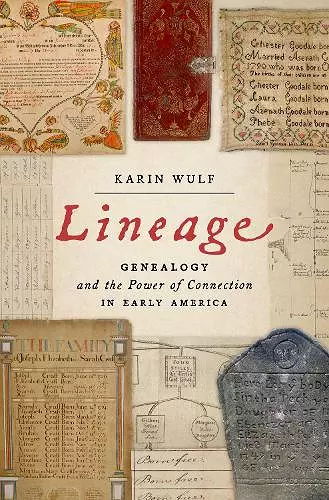Lineage
Genealogy and the Power of Connection in Early America
Format:Hardback
Publisher:Oxford University Press Inc
Published:30th Sep '25
Should be back in stock very soon

In eighteenth-century America, genealogy was more than a simple record of family ties--it was a powerful force that shaped society. Lineage delves into an era where individuals, families, and institutions meticulously documented their connections. Whether driven by personal passion or mandated by churches, local governments, and courts, these records appeared in diverse forms-from handwritten notes and account books to intricate silk threads and enduring stone carvings. Family connections wielded significant influence across governmental, legal, religious, cultural, and social spheres. In the American context, these ties also defined the boundaries of slavery and freedom, with a child's status often determined by their mother, despite the prevailing patriarchy. This book reveals the profound importance of genealogy that was chronicled by family records, cultural artifacts, and court documents. These materials, created by both enslaved individuals seeking freedom and founding fathers seeking status, demonstrate the culturally and historically specific nature of genealogical interest. Even as the American Revolution transformed society, the significance of genealogy endured. The legacy of lineage from the colonial period continued to shape the early United States, underscoring the enduring importance of family connections. Lineage offers a deep understanding of genealogy as a foundational element of American history, illuminating its vital role from the colonial era through the birth of the nation.
In Lineage, Karin Wulf guides us through the early modern archive of genealogies-the stories and records kept by Kings and commoners, English, African and Indigenous peoples in the Atlantic world, and brings their enduring importance to light-an importance rooted in the connection between family and state interests or, as she so cogently puts it, between emotion and power. The result is a stunning work, beautifully written and meticulously researched, in which the multiple meanings of family are made exceptionally clear. This is a gorgeously rendered work of history that should be read by anyone interested in the American past. * Jennifer L. Morgan, author of Reckoning with Slavery: Gender, Kinship and Capitalism in the Early Black Atlantic *
Karin Wulf has written an authoritative, engrossing history of an American characteristic - genealogy - and uncovered its surprisingly egalitarian role in the formation of the United States. Brisk, vivid, and brilliantly expansive, Lineage shows how Americans of all backgrounds - wealthy and poor, Black, Indigenous, and white, men and women - found themselves subject to the genealogical power of the state even as they embraced genealogy in their own families to claim its extraordinary cultural and legal authority in early America. Genealogy, Wulf reveals, was always more than a family affair. * William G. Thomas III, author of A Question of Freedom: The Families Who Challenged Slavery from the Nation's Founding to the Civil War *
Karin Wulf's Lineage transforms mind-numbing and mostly forgotten books and artifacts into vibrant accounts of forgotten pasts. A Wampanoag account book, a lock of hair, a staine=glass window, a goat-leather-bound genealogy of a Stuart King, and reams of court records, diaries, letters, and plantation accounts affirm that "genealogy has never been, nor is it now, purely a matter of private interest. * Laurel Thatcher Ulrich, author of The Age of Homespun: Objects and Stories in the Creation of an American Myth *
Karin Wulf brings together the personal and intimate motivations for genealogy with public record-keeping to tell a remarkable story about early America and the families that shaped it. Using information from families across all classes, races, religions, and regions, Wulf's illuminates the ways families and authority figures leveraged genealogy for personal and public goals. Lineage is a striking portrait of early America, highlighting the crucial role genealogy played in the machinations of familial, political, social, and economic power. * Amy Harris, author of Being Single in Georgian England *
ISBN: 9780197553220
Dimensions: 229mm x 160mm x 38mm
Weight: 635g
376 pages